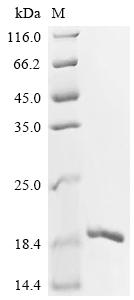Recombinant Human Apoptosis-associated speck-like protein containing a CARD (PYCARD) is produced in E. coli and spans the 95-195 amino acid region. This partial protein carries an N-terminal 6xHis-tag, which makes purification and detection more straightforward. The product shows a purity level exceeding 95%, as confirmed by SDS-PAGE analysis, making it suitable for various research applications. It is intended for research use only.
PYCARD, also known as ASC, serves as a crucial adaptor protein in inflammasome formation—multiprotein complexes that appear to play a key role in the innate immune response. Through its CARD and PYD domains, PYCARD mediates protein-protein interactions and helps activate caspase-1, which leads to the maturation of pro-inflammatory cytokines. Its role in inflammation has made it a significant focus in immunological research.
Potential Applications
Note: The applications listed below are based on what we know about this protein's biological functions, published research, and experience from experts in the field. However, we haven't fully tested all of these applications ourselves yet. We'd recommend running some preliminary tests first to make sure they work for your specific research goals.
Based on the provided information, the recombinant human PYCARD fragment (95-195aa) is expressed in E. coli, a prokaryotic system that is generally suitable for producing small protein domains but may not support proper folding of eukaryotic protein interaction domains. This fragment contains the CARD domain of PYCARD, which requires precise folding for its role in inflammasome signaling. While E. coli can express soluble proteins, death-fold domains like CARD need specific conformational integrity for functional homotypic interactions. The protein has high purity (>95%) with an N-terminal 6xHis tag, but since activity is unverified and CARD domains require precise folding for caspase recruitment, the protein cannot be assumed to be correctly folded or bioactive without experimental validation.
1. Protein-Protein Interaction Studies Using Pull-Down Assays
The N-terminal 6xHis tag enables technical feasibility for pull-down assays. However, if the recombinant PYCARD protein is misfolded, it will not interact physiologically with true binding partners (e.g., caspase-1, other CARD domains). This application requires confirmation of proper folding through biophysical characterization before biological interpretation of results.
2. Antibody Development and Validation
The recombinant PYCARD fragment can serve as an effective immunogen for generating antibodies against linear epitopes within the 95-195aa region. The high purity supports immunization protocols. Validation against full-length PYCARD is recommended.
3. Biochemical Characterization and Biophysical Analysis
This application is well-suited for initial assessment. Techniques like circular dichroism spectroscopy and size-exclusion chromatography can evaluate the protein's folding state and oligomeric status. These studies are valuable for quality control of the recombinant PYCARD protein, not the native PYCARD.
4. In Vitro Reconstitution Studies
This application is high-risk without proper folding validation. If the recombinant PYCARD protein is misfolded, reconstitution studies will not reflect biological reality. This requires prior demonstration of proper folding and interaction capability.
Final Recommendation & Action Plan
Given that this is a single domain protein expressed in E. coli, recommend first performing: 1) Biophysical characterization (circular dichroism for secondary structure, analytical ultracentrifugation for oligomeric state) to assess folding quality; 2) Functional validation using known CARD-domain binding partners; 3) Comparison with full-length PYCARD if possible. Antibody development can proceed immediately. Avoid functional studies until proper folding is confirmed. Always include appropriate controls and validate findings with full-length protein when possible.






